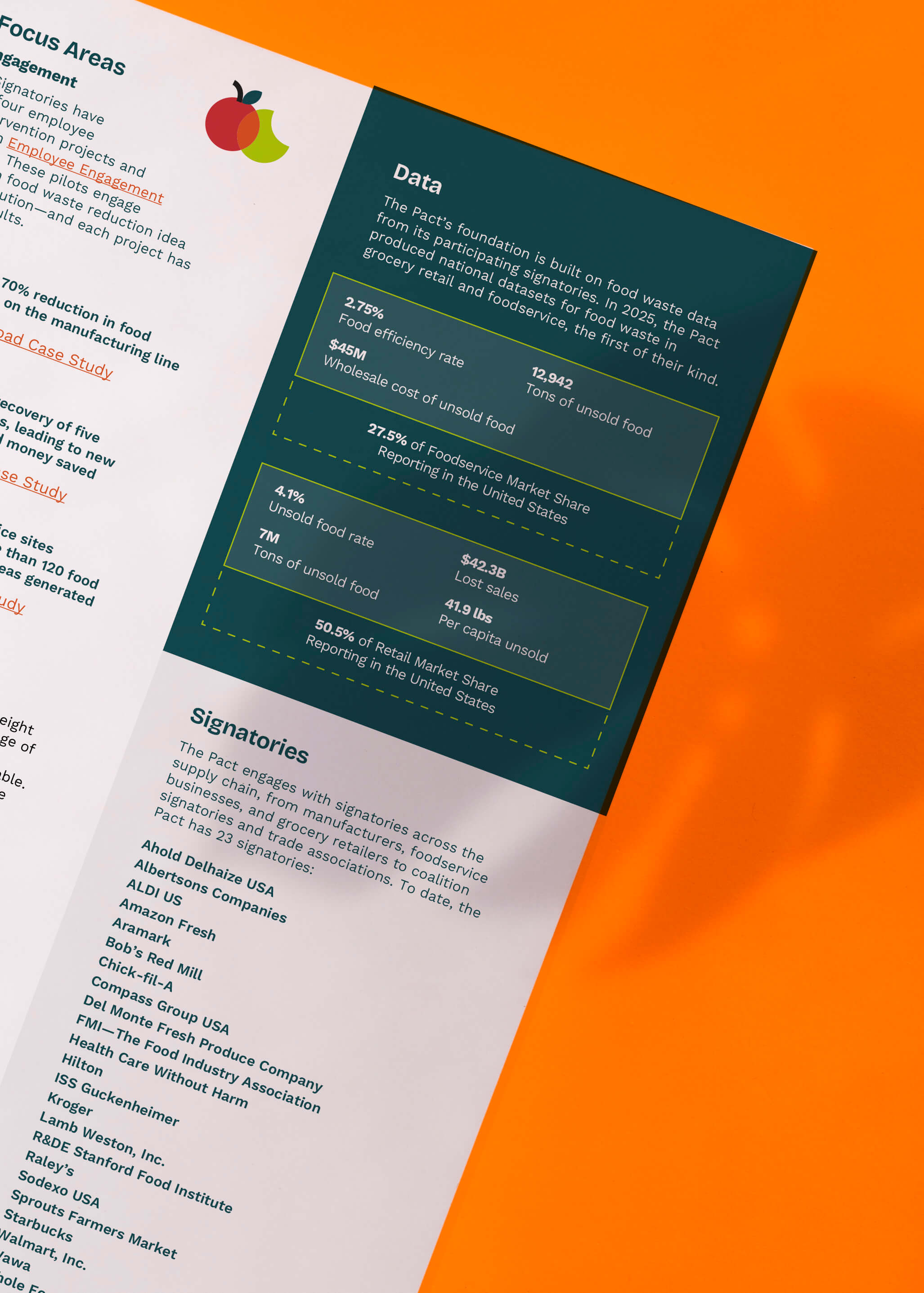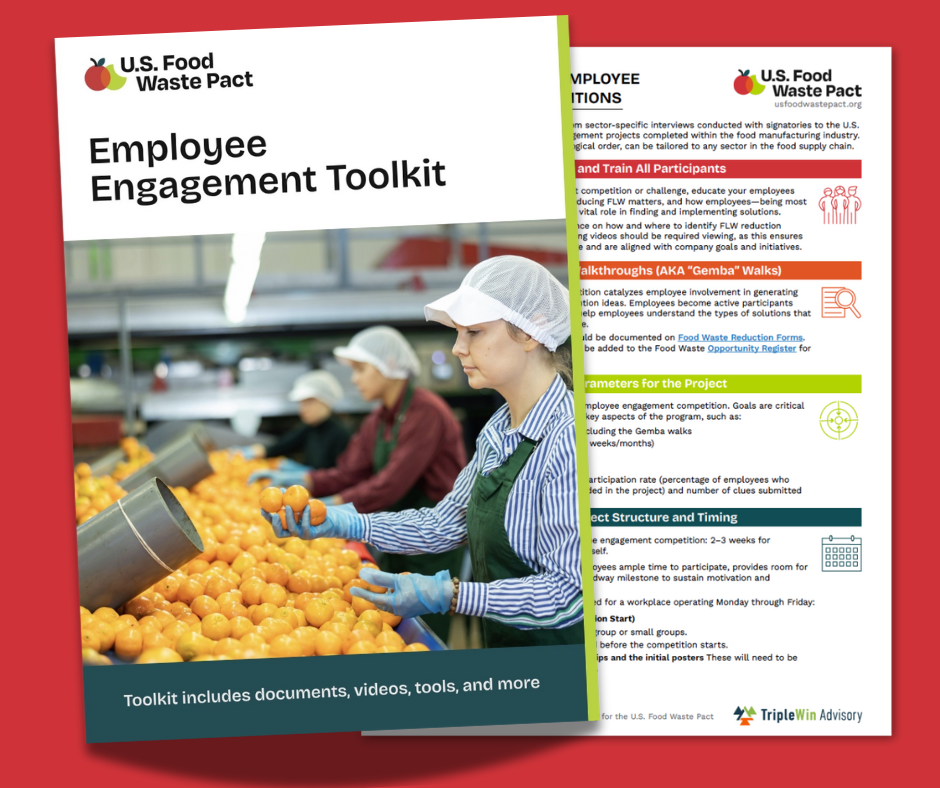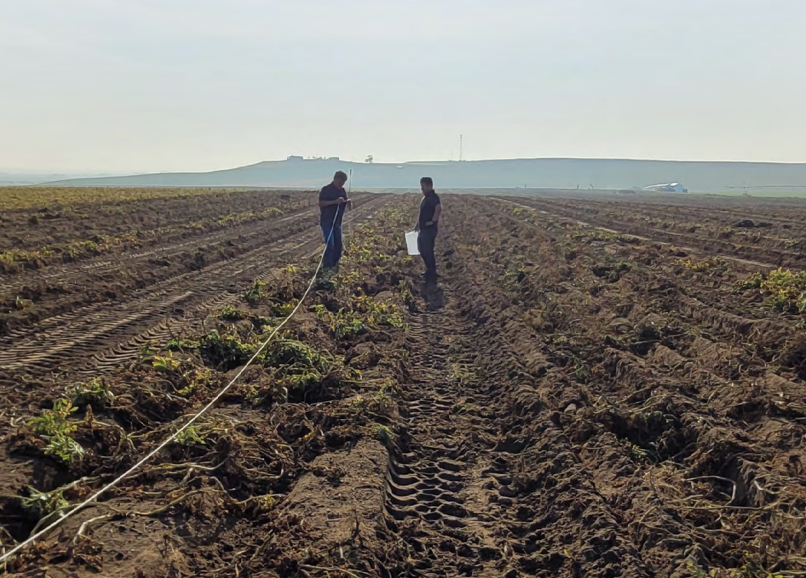Our Work
Explore our Work:
Using the “Target, Measure, Act” framework as a foundation, the U.S. Food Waste Pact focuses its efforts on three programmatic pillars:
Data Reporting
Data is at the core of the Pact’s programming. Without food waste data, progress toward reducing food waste can’t be measured. Here’s what the Pact does through data and measurement:
Signatories of the Pact share food waste data annually, aided by ReFED’s sector-based calculators.
That data is then aggregated, anonymized, and analyzed to determine year-over-year food waste trends and establish new industry benchmarks when applicable.
This data is then published in the Pact’s annual report, published at the beginning of each year.
After the Pact’s first year in operation, it established two new national datasets: one in retail and one in foodservice. With these datasets, new baselines were set, which will be used to measure progress. As the Pact continues to expand its reach across the food system, it hopes to establish more national datasets in new sectors.

Precompetitive Convenings
Working collaboratively across the supply chain is integral to making progress on food waste reduction. The Pact hosts two different kinds of precompetitive convenings—topic-based Working Groups and Sector Summits—for Pact signatories to come together and discuss best practices, common challenges, and potential pilot projects.

Working Groups
Working Groups are open to signatories from all sectors and center around a specific topic. Currently, the Pact runs three different Working Groups, and each meets virtually on a quarterly basis.
Food Recovery
This Working Group brings together signatories from all sectors who are focused on food recovery programs, initiatives, and practices in their operations. Signatories who have developed food recovery programs share lessons learned and best practices during these sessions, and ideas for potential pilot projects that focus on recovery are generated in these discussions.

Signatory Co-Chair
Kaity Robbins, Whole Foods Market
Staff Training & Engagement
This Working Group brings together signatories who are looking to engage frontline workers in food waste reduction efforts. This group shares common challenges that arise when trying to train staff and build cultures of sustainability in workplaces. Employee engagement pilot projects have shown significant progress in reducing food waste across sectors, and the ideas that have been generated by this Working Group have contributed greatly to that success.

Signatory Co-Chair
Christine Gallagher, Ahold Delhaize USA
Consumer Engagement & Environments
This Working Group is the most recent addition to this program, and the idea for it was generated by Pact signatories. According to ReFED’s latest estimates, consumers waste more food than any other sector. In addition to reducing the waste generated in their own operations, food businesses have a role to play when it comes to reducing consumer food waste. This Working Group brings signatories together to talk about best practices, new ideas, and innovative solutions to engage with consumers effectively to reduce waste.

Signatory Co-Chair
Natasha Tofil, Sprouts Farmers Market
Sector Summits
Sector Summits bring together signatories from the same sector to discuss unique challenges and opportunities to reduce food waste. Currently, the Pact runs four different Sector Summits, and each meets three to four times per year. Most meetings are virtual, but one in-person meet-up happens at the ReFED Food Waste Solutions Summit on an annual basis.

While the Pact works with signatories in more than just the following sectors, these are the four Sector Summits that are currently running:
Manufacturing & Distribution: Encompasses food manufacturers and distributors that produce, package, and distribute a wide range of food products.
Quick-service Restaurants: Includes fast food and fast casual establishments that provide limited-service dining.
Foodservice: Focuses on large foodservice companies that prepare and serve in corporate, collegiate, or other settings.
Grocery Retail: Covers traditional grocery stores, supermarkets, and other retail outlets that sell food products.
We also engage with coalition and association organizations that represent and support these respective industry sectors, such as FMI—The Food Industry Association, Health Care Without Harm, and the R&DE Stanford Food Institute.
Pilot Projects
The heart of the “Act” portion of the Pact’s foundational framework, pilot projects test and scale food waste solutions. Historically, these pilot projects have spanned solution types and sectors, from testing AI-powered inventory tracking in grocery stores to rolling out consumer messaging in multiple dining halls. Case studies of all of our completed pilot projects can be found in the Resources section.

There are two categories of pilots that boast more than one project: employee engagement pilots and whole chain pilots. These two pilot types have led to significant food waste reduction results and have produced open-source resources available to food businesses across the globe.
Employee Engagement
To date, four employee engagement pilots have been successfully completed across two sectors. Three of these took place in manufacturing plants, and one resulted in reducing food waste by 50% while the other two resulted in reducing food waste by more than 70% after implementing an employee-generated reduction idea. The fourth pilot took place across ten different foodservice sites and resulted in over 120 food reduction ideas.
The success of these pilots has inspired operational changes within the signatories who participated in them, and it led to the development of the Employee Engagement Toolkit, an open-source resource that gives food businesses the tools to run their own employee engagement programs to achieve similar results.
Employee Engagement Toolkit
The Employee Engagement Toolkit is an open-source portfolio of materials designed for food businesses of all kinds to pilot their own employee engagement intervention projects to address food waste in their operations.

Whole Chain
To date, eight whole chain pilots have been initiated, and four have been completed. These pilots occur in two phases. The primary goal of the first phase is to identify food waste hotspots at each node of the supply chain for a single commodity. The second phase identifies food waste solutions for one node based on the identified hotspots from phase one.
The whole chain pilots are the first projects of their kind in the United States, and commodities that have been studied or are in the process of being studied include strawberries, potatoes, plums, bananas, yogurt, and ground beef.
Whole Chain Resources
The Pact's whole chain pilots provide insights about food waste that happens across the entire supply chain and give recommendations on how businesses can work together to reduce it.

